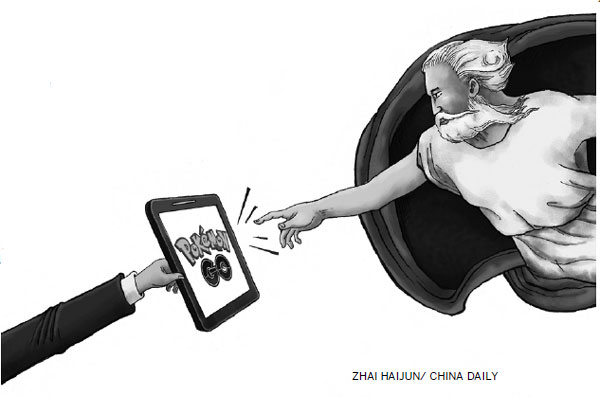How popular is Pokemon GO? For an answer, let's check out the data from some market research institutions. The videogame attracted more than 10 million users worldwide within a week of being put online, was searched more times than "Brexit" during that eventful week, and now has more daily active users than Twitter. And its developer Nintendo doubled its share price in two weeks thanks to game.
Some reports even said celebrities were seen playing it, with one saying Justin Bieber, accompanied by six bodyguards, was trying to capture a Pokemon in New York's Central Park.
Many smartphone game addicts confess they cannot understand why Pokemon GO is so popular. Its pictures follow a low-definition instead of high-definition cartoon style and the battle mode of the captured Pokemons is rather old fashioned. In other words, Pokemon GO has not made any improvements in picture quality or 3D modeling, two core elements of modern videogames.

Yet it has proven a huge success, and its success has much to do with a major breakthrough: It is the first major game that has adopted the augmented reality (AR) technology, which allows players to combine the virtual and real worlds.
First developed in the 1950s, almost all video games have tried to build a virtual world that shares some similarities with the real one. For example, the super-popular Super Mario Brothers series, made by Nintendo, built a world where one can jump high, dive and fly freely, while Warcraft, made by Blizzard, created a world like that of The Lord of Rings. That's why videogame-makers have been constantly improving the picture quality and 3D modeling of their products - they hope to more exactly imitate the real world and offer players a better experience in the virtual one.
NBA 2K16, made by 2K Games, has improved the details to such an extent that now the characters look highly real - you can even see beads of perspiration on the forehead of the character Michael Jordan when he sits down after a game. With the fast progress of smartphones, the imitation technology is being further improved.
Yet however hard they try, there remains a huge gap between the virtual and real worlds. The moment you lift your eyes from the display on your video screen you will realize how illusive the virtual world is.
Pokemon GO is revolutionary because it puts virtual images in the real world. It is far from being perfect, but that could be the future direction of videogames given the breakthrough it has achieved. Besides, it has rather smartly chosen the AR technology over virtual reality (VR) technology. The latter is costlier because it "creates" a virtual world where all the objects must be based on models, while AR is much cheaper because it uses the existing real world as it is. Had Pokemon GO used VR technology, it would have been costlier, and players would first have to buy the necessary devices at additional costs to play it.
Moreover, to use VR technology, one has to wear a helmet to feel the virtual world while with games using AR technology all one needs to do is to turn on the camera of the smartphone and see the world on its screen. If every player had to wear a helmet to play Pokemon GO, it would not have been so popular.
Pokemon GO has caught people's imagination because it uses the future technology of videogames as well as adopts a smart strategy to lower the threshold of playing the game. More games using AR technology will hit the market and could become even more popular, but Pokemon GO will always be remembered as the pioneer in its field.
The author is a writer with China Daily. zhangzhouxiang@chinadaily.com.cn
(China Daily 07/30/2016 page5)

It has been a while since I've contributed to this Forum and I figured that since now I am officially on summer holiday and another school year is behind me I would share a post with you.